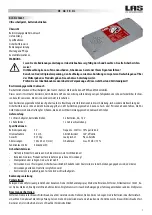
CHAPTER 5: SETTINGS
GROUPED ELEMENTS
L90 LINE CURRENT DIFFERENTIAL SYSTEM – INSTRUCTION MANUAL
5-239
5
configured under the
DISTANCE SOURCE
. This setting specifies the ratio between the magnitudes of the mutual zero-
sequence impedance between the lines and the positive-sequence impedance of the protected line. Set this setting to zero
if the compensation is not to be performed. Note that internally the mutual coupling compensation is applied only if
3I_0>1.22*IG to ensure that no mutual coupling compensation is applied when the fault is on the parallel line. Mutual
coupling compensation is applied when distance source is assigned with 8F or 8L type DSP module only and when the
ratio of the protected line ground current to parallel line ground current is greater than 1.22.
GND DIST Z1 ZOM/Z1 ANG
— This setting specifies the angle difference between the mutual zero-sequence impedance
between the lines and the positive-sequence impedance of the protected line.
GND DIST Z1 REACH
— This setting defines the reach of the zone for the forward and reverse applications. In non-directional
applications, this setting defines the forward reach of the zone. The reverse reach impedance in non-directional
applications is set independently. The angle of the reach impedance is entered as the
GND DIST Z1 RCA
setting. The reach
impedance is entered in secondary ohms.
To achieve specified operating speed of distance elements, the relay internally calculates source to line impedance ratio
(SIR) from fault phasors. In these calculations, line impedance is estimated based on the zone 1 reach setting. Therefore, in
order to calculate the SIR value properly and to maintain the optimal operating speed of the distance elements, set zone 1
reach with a regular 80 to 85% of the line impedance reach setting, even when zone 1 is disabled.
GND DIST Z1 RCA
— This setting specifies the characteristic angle (similar to the maximum torque angle in previous
technologies) of the ground distance characteristic for the forward and reverse applications. In the non-directional
applications, this setting defines the forward reach of the zone. The reverse reach impedance in the non-directional
applications is set independently. This setting is independent from the
GND DIST Z1 DIR RCA
setting (the characteristic angle
of an extra directional supervising function).
GND DIST Z1 REV REACH
— This setting defines the reverse reach of the zone set to non-directional (
GND DIST Z1 DIR
setting).
The value must be entered in secondary ohms. This setting does not apply when the zone direction is set to “Forward” or
“Reverse.”
GND DIST Z1 REV REACH RCA
— This setting defines the angle of the reverse reach impedance if the zone is set to non-
directional (
GND DIST Z1 DIR
setting). This setting does not apply when the zone direction is set to “Forward” or “Reverse.”
GND DIST Z1 POL CURRENT
— This setting applies only if the
GND DIST Z1 SHAPE
is set to “Quad” and controls the polarizing
current used by the reactance comparator of the quadrilateral characteristic. Either the zero-sequence or negative-
sequence current can be used. In general, a variety of system conditions must be examined to select an optimum
polarizing current. This setting becomes less relevant when the resistive coverage and zone reach are set conservatively.
Also, this setting is more relevant in lower voltage applications such as on distribution lines or cables, as compared with
high-voltage transmission lines. This setting applies to both the zone 1 and reverse reactance lines if the zone is set to non-
directional. See the Application of Settings chapter for additional information.
GND DIST Z1 NON-HOMOGEN ANG
— This setting applies only if the
GND DIST Z1 SHAPE
is set to “Quad” and provides a method
to correct the angle of the polarizing current of the reactance comparator for non-homogeneity of the zero-sequence or
negative-sequence networks. In general, a variety of system conditions must be examined to select this setting. In many
applications this angle is used to reduce the reach at high resistances in order to avoid overreaching under far-out reach
settings and/or when the sequence networks are greatly non-homogeneous. This setting applies to both the forward and
reverse reactance lines if the zone is set to non-directional. See the Application of Settings chapter for additional
information.
GND DIST Z1 COMP LIMIT
— This setting shapes the operating characteristic. In particular, it enables a lens-shaped
characteristic of the mho function and a tent-shaped characteristic of the quadrilateral function reactance boundary. If
the mho shape is selected, the same limit angle applies to mho and supervising reactance comparators. In conjunction
with the mho shape selection, this setting improves loadability of the protected line. In conjunction with the quadrilateral
characteristic, this setting improves security for faults close to the reach point by adjusting the reactance boundary into a
tent-shape.
The relay internally performs zero-sequence compensation for the protected circuit based on the values entered
for
GND DIST Z1 Z0/Z1 MAG
and
GND DIST Z1 Z0/Z1 ANG
, and if configured to do so, zero-sequence compensation for
mutual coupling based on the values entered for
GND DIST Z1 Z0M/Z1 MAG
and
GND DIST Z1 Z0M/Z1 ANG
. As such,
enter the
GND DIST Z1 REACH
and
GND DIST Z1 RCA
values in terms of positive sequence quantities.
















































